初中英语被动语态讲解与练习
- 格式:doc
- 大小:76.00 KB
- 文档页数:9
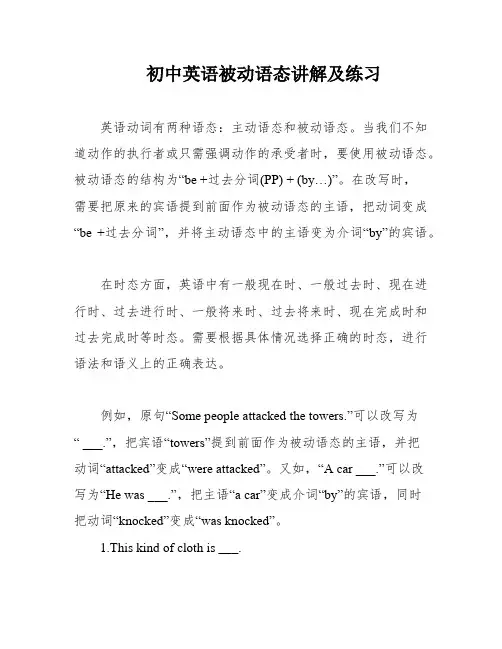
初中英语被动语态讲解及练习英语动词有两种语态:主动语态和被动语态。
当我们不知道动作的执行者或只需强调动作的承受者时,要使用被动语态。
被动语态的结构为“be +过去分词(PP) + (by…)”。
在改写时,需要把原来的宾语提到前面作为被动语态的主语,把动词变成“be +过去分词”,并将主动语态中的主语变为介词“by”的宾语。
在时态方面,英语中有一般现在时、一般过去时、现在进行时、过去进行时、一般将来时、过去将来时、现在完成时和过去完成时等时态。
需要根据具体情况选择正确的时态,进行语法和语义上的正确表达。
例如,原句“Some people attacked the towers.”可以改写为“ ___.”,把宾语“towers”提到前面作为被动语态的主语,并把动词“attacked”变成“were attacked”。
又如,“A car ___.”可以改写为“He was ___.”,把主语“a car”变成介词“by”的宾语,同时把动词“knocked”变成“was knocked”。
1.This kind of cloth is ___.2.When the infinitive is used as an adverb after certain adjectives and has a direct object。
it takes the active form to express passive meaning.Examples:The fish is not fit to eat.We find English hard to learn.The article is difficult to understand.3.When the infinitive is used as a postpositive attributive。
it takes the active form to express passive meaning.Examples:I have a lot of homework to do.I'll give him some books to read.4.When a ___ a state or n。
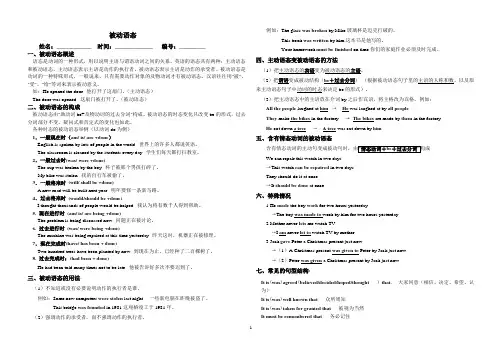
被动语态姓名:____________ 时间:_____________ 编号:_________一、被动语态概述语态是动词的一种形式,用以说明主语与谓语动词之间的关系。
英语的语态共有两种:主动语态和被动语态。
主动语态表示主语是动作的执行者,被动语态表示主语是动作的承受者。
被动语态是动词的一种特殊形式,一般说来,只有需要动作对象的及物动词才有被动语态。
汉语往往用"被"、"受"、"给"等词来表示被动意义。
如:He opened the door. 他打开了这扇门。
(主动语态)The door was opened. 这扇门被打开了。
(被动语态)二、被动语态的构成被动语态由"助动词be+及物动词的过去分词"构成。
被动语态的时态变化只改变be的形式,过去分词部分不变。
疑问式和否定式的变化也如此。
各种时态的被动语态举例(以动词do为例)1.一般现在时(am/ is/ are +done)English is spoken by lots of people in the world. 世界上的许多人都说英语。
The classroom is cleaned by the students every day. 学生们每天都打扫教室。
2.一般过去时(was/ were +done)The cup was broken by the boy. 杯子被那个男孩打碎了。
My bike was stolen. 我的自行车被偷了。
3.一般将来时(will/ shall be +done)A new road will be built next year. 明年要修一条新马路。
4.过去将来时(would/should be +done)I thought thousands of people would be helped. 我认为将有数千人得到帮助。
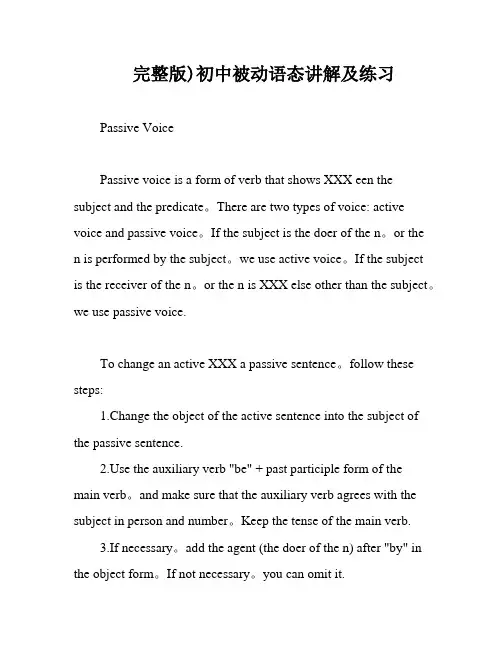
完整版)初中被动语态讲解及练习Passive VoicePassive voice is a form of verb that shows XXX een the subject and the predicate。
There are two types of voice: active voice and passive voice。
If the subject is the doer of the n。
or the n is performed by the subject。
we use active voice。
If the subjectis the receiver of the n。
or the n is XXX else other than the subject。
we use passive voice.To change an active XXX a passive sentence。
follow these steps:1.Change the object of the active sentence into the subject of the passive sentence.e the auxiliary verb "be" + past participle form of the main verb。
and make sure that the auxiliary verb agrees with the subject in person and number。
Keep the tense of the main verb.3.If necessary。
add the agent (the doer of the n) after "by" in the object form。
If not necessary。
you can omit it.4.Keep the other elements (adjectives。
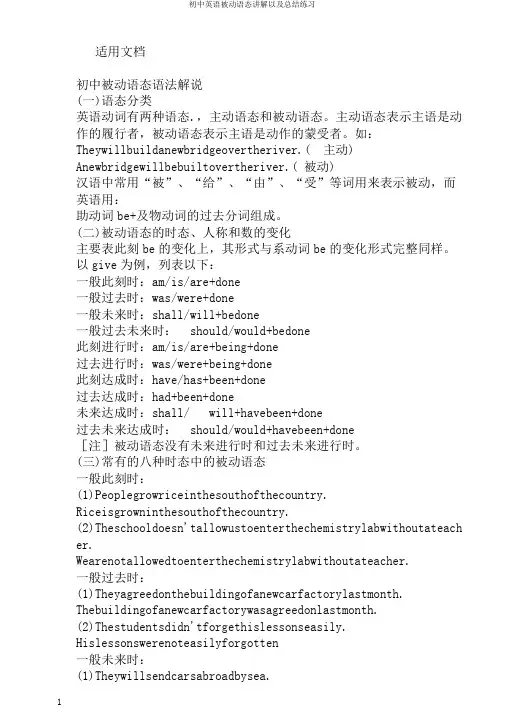
适用文档初中被动语态语法解说(一)语态分类英语动词有两种语态.,主动语态和被动语态。
主动语态表示主语是动作的履行者,被动语态表示主语是动作的蒙受者。
如:Theywillbuildanewbridgeovertheriver.( 主动) Anewbridgewillbebuiltovertheriver.( 被动)汉语中常用“被”、“给”、“由”、“受”等词用来表示被动,而英语用:助动词be+及物动词的过去分词组成。
(二)被动语态的时态、人称和数的变化主要表此刻be的变化上,其形式与系动词be的变化形式完整同样。
以give为例,列表以下:一般此刻时:am/is/are+done一般过去时:was/were+done一般未来时:shall/will+bedone一般过去未来时:should/would+bedone此刻进行时:am/is/are+being+done过去进行时:was/were+being+done此刻达成时:have/has+been+done过去达成时:had+been+done未来达成时:shall/ will+havebeen+done过去未来达成时:should/would+havebeen+done[注]被动语态没有未来进行时和过去未来进行时。
(三)常有的八种时态中的被动语态一般此刻时:(1)Peoplegrowriceinthesouthofthecountry. Riceisgrowninthesouthofthecountry.(2)Theschooldoesn'tallowustoenterthechemistrylabwithoutateach er. Wearenotallowedtoenterthechemistrylabwithoutateacher.一般过去时:(1)Theyagreedonthebuildingofanewcarfactorylastmonth. Thebuildingofanewcarfactorywasagreedonlastmonth.(2)Thestudentsdidn'tforgethislessonseasily. Hislessonswerenoteasilyforgotten一般未来时:(1)Theywillsendcarsabroadbysea.Carswillbesentabroadbysea.(2)Theywillgiveplentyofjobstoschool-leavers. Plentyofjobswillbegiventoschool-leavers.过去未来时:(1)Themanagersaidtheywouldcompletetheprojectbytheendoftheyear. Themanagersaidtheprojectwouldbecompletedbytheendoftheyear. Theworkerstoldmetheywouldmendthecarassoonaspossible.Theworker stoldmethatthecarwouldbemendedassoonaspossible.5.此刻进行时:文案大全适用文档(1)TheradioisbroadcastingEnglishlessons. Englishlessonsarebeingbroadcastedontheradio.Wearepaintingtherooms.Theroomsarebeingpainted.6.过去进行时:(1)Theworkersweremendingtheroad.Theroadwasbeingmended.(2)Thistimelastyearwewereplantingtreeshere. Treeswerebeingplantedherethistimelastyear.此刻达成时:(1)Someonehastoldmethesportsmeetingmightbeputoff. Ihavebeentoldthesportsmeetingmightbeputoff.(2)Hehasbroughthisbookhere.Hisbookhasbeenbroughthere.过去达成时:(1)WhenIgottothetheatre,Ifoundtheyhadalreadysoldoutthetickets. WhenIgottothetheatre,Ifoundtheticketshadalreadybeensoldout. Thewholecountrywasverysadatthenewsofhisdeath;Peoplehadconsideredhimtobeagreatleade r.Hehadbeenconsideredtobeagreatleader(四)含有神态动词的被动语态:含有神态动词的被动语态是由“神态动词+be+及物动词的过去分词”组成。
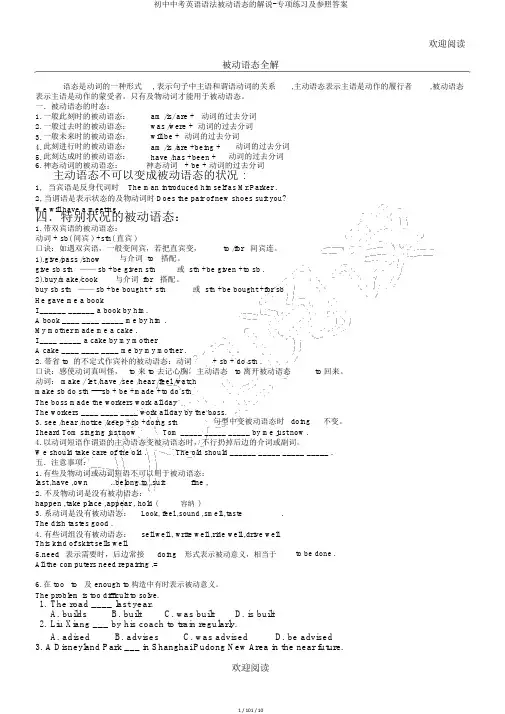
欢迎阅读被动语态全解语态是动词的一种形式 , 表示句子中主语和谓语动词的关系 ,主动语态表示主语是动作的履行者,被动语态表示主语是动作的蒙受者。
只有及物动词才能用于被动语态。
一.被动语态的时态:1. 一般此刻时的被动语态: am /is/ are + 动词的过去分词2. 一般过去时的被动语态: was /were + 动词的过去分词3. 一般未来时的被动语态: will be + 动词的过去分词4. 此刻进行时的被动语态: am /is /are +being + 动词的过去分词5. 此刻达成时的被动语态: have /has +been + 动词的过去分词6. 神态动词的被动语态: 神态动词 + be + 动词的过去分词主动语态不可以变成被动语态的状况 :1, 当宾语是反身代词时 The man introduced himself as Mr.Parker . 2, 当谓语是表示状态的及物动词时Does the pair of new shoes suit you? We will have a meeting .四.特别状况的被动语态:1. 带双宾语的被动语态: 动词 + sb( 间宾 ) +sth( 直宾 )口诀:如遇双宾语,一般变间宾,若把直宾变, to /for 间宾连。
1).give/pass /show 与介词 to 搭配。
give sb sth —— sb +be given sth 或 sth +be given +to sb .2).buy/make/cook 与介词 for 搭配。
buy sb sth —— sb +be bought + sth 或 sth +be bought +for sb He gave me a book I ______ ______ a book by him. A book ____ ____ _____ me by him . My mother made me a cake . I ____ _____ a cake by my mother A cake ____ ____ ____ me by my mother . 2. 带省 to 的不定式作宾补的被动语态:动词 + sb + do sth . 口诀:感使动词真叫怪, to 来 to 去记心胸,主动语态 to 离开被动语态 to 回来。

被动语态(一)语态分类英语动词有两种语态,主动语态和被动语态。
主动语态表示主语是动作的执行者,被动语态表示主语是动作的承受者。
如:They will build a new bridge over the river. (主动)A new bridge will be built over the river. (被动)汉语中常用“被”、“给”、“由”、“受”等词用来表示被动,而英语用:助动词be+ 及物动词的过去分词构成。
(二)被动语态常用的八种时态1. 一般现在时People grow rice in the south of the states.Rice ______in the south of the states.2. 一般过去时They agreed on the building of a new car factory last month.The building of a new car factory _______last month.3. 一般将来时They will send cars abroad by sea.Cars ________abroad by sea.4. 过去将来时The workers told me they would mend the car as soon as possible.The workers told me that the car ________as soon as possible.5. 现在进行时——Have you moved into the new house?——Not yet. We are painting the rooms.The rooms are being painted.6. 过去进行时This time last year we were planting trees here.Trees were being planted here this time last year.7. 现在完成时We have brought down the price.The price ___________down.8. 过去完成时When I got to the theatre, I found they had already sold out the tickets.When I got to the theatre, I found the tickets ___already ______out.9. 含有情态动词的被动语态含有情态动词的被动语态是由“情态动词+ be+ 及物动词的过去分词”构成。
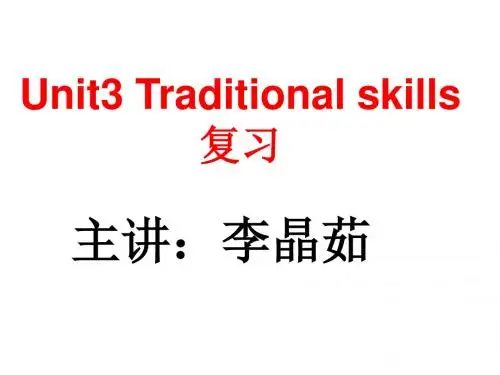
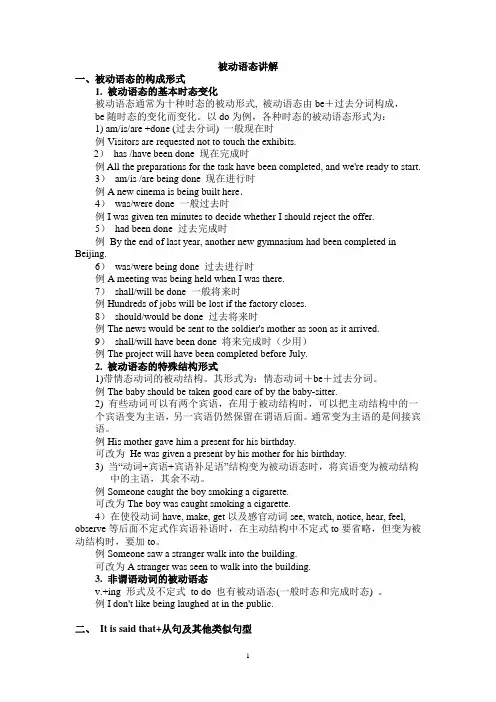
被动语态讲解一、被动语态的构成形式1. 被动语态的基本时态变化被动语态通常为十种时态的被动形式, 被动语态由be+过去分词构成,be随时态的变化而变化。
以do为例,各种时态的被动语态形式为:1) am/is/are +done (过去分词) 一般现在时例Visitors are requested not to touch the exhibits.2)has /have been done 现在完成时例All the preparations for the task have been completed, and we're ready to start.3)am/is /are being done 现在进行时例A new cinema is being built here.4)was/were done 一般过去时例I was given ten minutes to decide whether I should reject the offer.5)had been done 过去完成时例By the end of last year, another new gymnasium had been completed in Beijing.6)was/were being done 过去进行时例A meeting was being held when I was there.7)shall/will be done 一般将来时例Hundreds of jobs will be lost if the factory closes.8)should/would be done 过去将来时例The news would be sent to the soldier's mother as soon as it arrived.9)shall/will have been done 将来完成时(少用)例The project will have been completed before July.2. 被动语态的特殊结构形式1)带情态动词的被动结构。
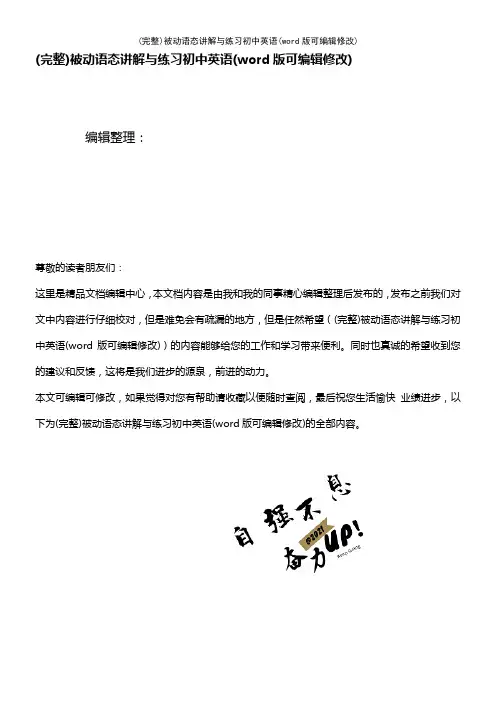
(完整)被动语态讲解与练习初中英语(word版可编辑修改)编辑整理:尊敬的读者朋友们:这里是精品文档编辑中心,本文档内容是由我和我的同事精心编辑整理后发布的,发布之前我们对文中内容进行仔细校对,但是难免会有疏漏的地方,但是任然希望((完整)被动语态讲解与练习初中英语(word版可编辑修改))的内容能够给您的工作和学习带来便利。
同时也真诚的希望收到您的建议和反馈,这将是我们进步的源泉,前进的动力。
本文可编辑可修改,如果觉得对您有帮助请收藏以便随时查阅,最后祝您生活愉快业绩进步,以下为(完整)被动语态讲解与练习初中英语(word版可编辑修改)的全部内容。
Passive Voice语态是英语动词的一种表现形式,用来说明主语和谓语动词之间的关系。
_____________:主语是动作的执行者_____________: 主语是动作的承受者Lu Xun wrote this book. —--—--—> This book is written by Lu Xun。
I listen to that music every day ——----〉 That music is listened to by me every day.被动语态的构成:_______________________主动语态改为被动语态的方法主动语态:主语 + 动词 + 宾语被动语态: 主语 + be + 动词过去分词+ by +宾语被动语态的时态(在be动词上体现)1.一般现在时am/ is/ are + doneThe notes asks the visitors not to touch the exhibits。
____________________________________________2.一般过去时was/ were + doneThey gave me 10 minutes to decide。
_________________________________________________________3.一般将来时 will be/ am;is;are going to be + doneWe will finish the project in 10 days。
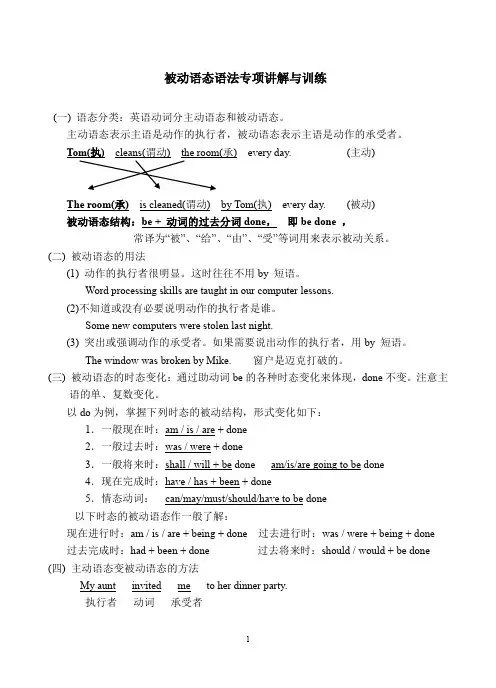
被动语态语法专项讲解与训练(一) 语态分类:英语动词分主动语态和被动语态。
主动语态表示主语是动作的执行者,被动语态表示主语是动作的承受者。
every day. (主动)The room(承) is cleaned(谓动) by Tom(执) every day. (被动)被动语态结构:be + 动词的过去分词done,即be done ,常译为“被”、“给”、“由”、“受”等词用来表示被动关系。
(二) 被动语态的用法(1) 动作的执行者很明显。
这时往往不用by 短语。
Word processing skills are taught in our computer lessons.(2)不知道或没有必要说明动作的执行者是谁。
Some new computers were stolen last night.(3) 突出或强调动作的承受者。
如果需要说出动作的执行者,用by 短语。
The window was broken by Mike. 窗户是迈克打破的。
(三) 被动语态的时态变化:通过助动词be的各种时态变化来体现,done不变。
注意主语的单、复数变化。
以do为例,掌握下列时态的被动结构,形式变化如下:1.一般现在时:am / is / are + done2.一般过去时:was / were + done3.一般将来时:shall / will + be done am/is/are going to be done4.现在完成时:have / has + been + done5.情态动词:can/may/must/should/have to be done以下时态的被动语态作一般了解:现在进行时:am / is / are + being + done 过去进行时:was / were + being + done 过去完成时:had + been + done 过去将来时:should / would + be done (四) 主动语态变被动语态的方法My aunt invited me to her dinner party.执行者动词承受者→ I was invited (by my aunt ) to her dinner party.承受者谓语by+执行者1.把主动语态的宾语变成被动语态的主语。
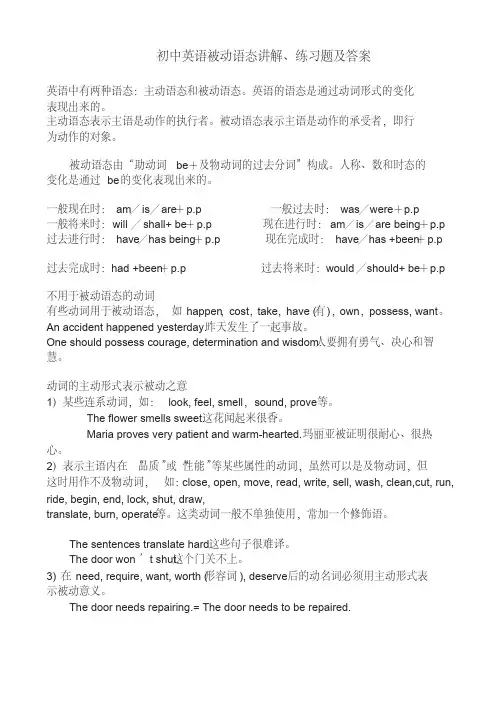
初中英语被动语态讲解、练习题及答案英语中有两种语态:主动语态和被动语态。
英语的语态是通过动词形式的变化表现出来的。
主动语态表示主语是动作的执行者。
被动语态表示主语是动作的承受者,即行为动作的对象。
被动语态由“助动词be+及物动词的过去分词”构成。
人称、数和时态的变化是通过be的变化表现出来的。
一般现在时:am/is/are+p.p一般过去时:was/were+p.p一般将来时:will/shall+ be+p.p现在进行时:am/is/are being+p.p 过去进行时:have/has being+p.p现在完成时:have/has +been+p.p过去完成时:had +been+p.p过去将来时:would/should+ be+p.p不用于被动语态的动词有些动词用于被动语态,如happen,cost,take,have (有),own,possess, want 。
An accident happened yesterday. 昨天发生了一起事故。
One should possess courage, determination and wisdom. 人要拥有勇气、决心和智慧。
动词的主动形式表示被动之意1)某些连系动词,如:look, feel, smell,sound, prove等。
The flower smells sweet.这花闻起来很香。
Maria proves very patient and warm-hearted. 玛丽亚被证明很耐心、很热心。
2)表示主语内在“品质”或“性能”等某些属性的动词,虽然可以是及物动词,但这时用作不及物动词,如:close, open, move, read, write, sell, wash, clean,cut, run, ride, begin, end, lock, shut, draw,translate, burn, operate等。
初中中考英语语法被动语态的讲解-专项练习及参考答案被动语态全解语态是动词的一种形式,表示句子中主语和谓语动词的关系,主动语态表示主语是动作的执行者,被动语态表示主语是动作的承受者。
只有及物动词才能用于被动语态。
一.被动语态的时态:1.一般现在时的被动语态:am /is/ are +动词的过去分词2.一般过去时的被动语态:was /were +动词的过去分词3.一般将来时的被动语态:will be +动词的过去分词4.现在进行时的被动语态:am /is /are +being +动词的过去分词5.现在完成时的被动语态:have /has +been +动词的过去分词6.情态动词的被动语态:情态动词+ be +动词的过去分词主动语态不能变为被动语态的情况:1, 当宾语是反身代词时The man introduced himself as Mr.Parker .2,当谓语是表示状态的及物动词时Does the pair of new shoes suit you?We will have a meeting .四.特殊情况的被动语态:1.带双宾语的被动语态:动词+ sb(间宾) +sth(直宾)口诀:如遇双宾语,一般变间宾,若把直宾变,to /for 间宾连。
1).give/pass /show 与介词to 搭配。
give sb sth —— sb +be given sth 或sth +be given +to sb .2).buy/make/cook 与介词for 搭配。
buy sb sth —— sb +be bought + sth 或sth +be bought +for sbHe gave me a bookI ______ ______ a book by him.A book ____ ____ _____ me by him .My mother made me a cake .I ____ _____ a cake by my motherA cake ____ ____ ____ me by my mother .2.带省to 的不定式作宾补的被动语态:动词+ sb + do sth .口诀:感使动词真叫怪,to来to去记心怀,主动语态to离去被动语态to回来。
被动语态全解语态是动词的一种形式,表示句子中主语和谓语动词的关系,主动语态表示主语是动作的执行者,被动语态表示主语是动作的承受者。
只有及物动词才能用于被动语态。
一.被动语态的时态:1.一般现在时的被动语态:am /is/ are +动词的过去分词2.一般过去时的被动语态:was /were +动词的过去分词3.一般将来时的被动语态:will be +动词的过去分词4.现在进行时的被动语态:am /is /are +being +动词的过去分词5.现在完成时的被动语态:have /has +been +动词的过去分词6.情态动词的被动语态:情态动词+ be +动词的过去分词主动语态不能变为被动语态的情况:1, 当宾语是反身代词时The man introduced himself as Mr.Parker .2,当谓语是表示状态的及物动词时Does the pair of new shoes suit you?We will have a meeting .四.特殊情况的被动语态:1.带双宾语的被动语态:动词+ sb(间宾) +sth(直宾)口诀:如遇双宾语,一般变间宾,若把直宾变,to /for 间宾连。
1).give/pass /show 与介词to 搭配。
give sb sth —— sb +be given sth 或sth +be given +to sb .2).buy/make/cook 与介词for 搭配。
buy sb sth —— sb +be bought + sth 或sth +be bought +for sbHe gave me a bookI ______ ______ a book by him.A book ____ ____ _____ me by him .My mother made me a cake .I ____ _____ a cake by my motherA cake ____ ____ ____ me by my mother .2.带省to 的不定式作宾补的被动语态:动词+ sb + do sth .口诀:感使动词真叫怪,to来to去记心怀,主动语态to离去被动语态to回来。
... . . . 资料 . .. 初中被动语态语法讲解
(一) 语 态 分 类 英语动词有两种语态,主动语态和被动语态。主动语态表示主语是动作的执行者,被动语态表示主语是动作的承受者。如: They will build a new bridge over the river. (主动) A new bridge will be built over the river. (被动) 汉语中常用“被”、“给”、“由”、“受”等词用来表示被动,而英语用: 助动词be + 及物动词的过去分词构成。 (二) 被动语态的时态、人称和数的变化 主要体现在be的变化上,其形式与系动词be的变化形式完全一样。不同时态的被动语态,列表如下: 一般现在时:am / is / are + done 一般过去时:was / were + done 一般将来时:shall / will + be done 一般过去将来时:should / would + be done 现在进行时:am / is / are + being + done 过去进行时:was / were + being + done 现在完成时:have / has + been + done 过去完成时:had + been + done 将来完成时:shall / will + have been + done 过去将来完成时:should / would + have been + done [注]被动语态没有将来进行时和过去将来进行时。 (三)常见的八种时态中的被动语态 1. 一般现在时: (1)People grow rice in the south of the country. Rice is grown in the south of the country. (2)The school doesn't allow us to enter the chemistry lab without a teacher. We are not allowed to enter the chemistry lab without a teacher. 2. 一般过去时: (1)They agreed on the building of a new car factory last month. The building of a new car factory was agreed on last month. (2)The students didn't forget his lessons easily. His lessons were not easily forgotten 3. 一般将来时: (1)They will send cars abroad by sea. Cars will be sent abroad by sea. (2)They will give plenty of jobs to school-leavers. Plenty of jobs will be given to school-leavers. ... . . . 资料 . .. 4. 过去将来时:
(1)The manager said they would complete the project by the end of the year. The manager said the project would be completed by the end of the year. (2) The workers told me they would mend the car as soon as possible. The workers told me that the car would be mended as soon as possible. 5. 现在进行时: (1)The radio is broadcasting English lessons. English lessons are being broadcasted on the radio. (2) We are painting the rooms. The rooms are being painted. 6. 过去进行时: (1)The workers were mending the road. The road was being mended. (2)This time last year we were planting trees here. Trees were being planted here this time last year. 7. 现在完成时: (1)Someone has told me the sports meeting might be put off. I have been told the sports meeting might be put off. (2)He has brought his book here. His book has been brought here. 8. 过去完成时: (1)When I got to the theatre, I found they had already sold out the tickets. When I got to the theatre, I found the tickets had already been sold out. (2) People had considered him to be a great leader. He had been considered to be a great leader (四) 含有情态动词的被动语态: 含有情态动词的被动语态是由“情态动词+ be+ 及物动词的过去分词”构成。 (1)You must hand in your compositions after class. Your compositions must be handed in after class. (2)He can write a great many letters with the computer. A great many letters can be written with the computer by him. (五) 被 动 语 态 的 使 用 1.当不知道或没有必要指出动作的执行者时,常用被动语态,这时往往不用by 短语。
“Mr. White, the cup was broken after class. ” 2.突出或强调动作的承受者,如果需要说出动作的执行者,用by 短语。 These records were made by John Denver. The cup was broken by Paul. 3.当汉语句子的主语既不是动作的执行者,也不是动作的承受者时,这时常用in + 名词作状... . . . 资料 . .. 语,而代替 by 短语。
These cars were made in China. (六)主动语态变被动语态的方法 (1) My aunt invited me to her dinner party. 主语 谓语 宾语 → I was invited (by my aunt ) to her dinner party. 主语 谓语 宾语 (2) The school set up a special class to help poor readers. → A special class to help poor readers was set up in the school. 1.把主动语态的宾语变成被动语态的主语。 2.把主动语态的谓语变成被动语态的be + 过去分词,时态要与原句保持一致。 3.把主动语态的主语变为介词by 的宾语,放在被动语态里谓语动词之后,by 短语可以省略。如果原句主语是地名词作状语。 (七)语态转换时所注意的问题 1. 把主动语态变为被动语态点名词,在被动语态中用in + 地点时,其谓语动词的时态要与原句时态保持一致,其谓语动词的数要与新主语保持一致。 We have bought a new computer. A new computer has been bought. (正确) A new computer have been bought. (错误) 2. 含有双宾语的主动句变被动句时,可分别将其中的一个宾语变为主语,另一个不动,一般变间接宾语为主语时比较多。 My uncle gave me a present on my birthday. I was given a present on my birthday. 如果把直接宾语(指物)改为主语,则在间接宾语(指人)前加适当的介词,如上句还可以说: A present was given to me yesterday. 注意: 1.一般在下列动词后,常在间接宾语前用介词 to,如: bring, give, hand, lend, offer, pass, pay, promise, sell, show, take, teach, tell 等。 (1) The book was showed to the class. (2) My bike was lent to her. 2.一般在下列动词后,间接宾语前用介词 for, 如: build, buy, cook, cut, choose, do, fetch, find, fix, get, keep, make, order, paint, play, sing 等。 (1) A new skirt was made for me. (2) The meat was cooked for us. (3) Some country music was played for us. 3. 由动词+ 介词或副词构成的短语动词,要把它们作为整体看,即把它们看成一个及物动词,介词或副词不可拆开或漏掉。这类动词有: 不及物动词+ 介词,如: agree to, ask for, laugh at, operated on, listen to, look after, think of, talk